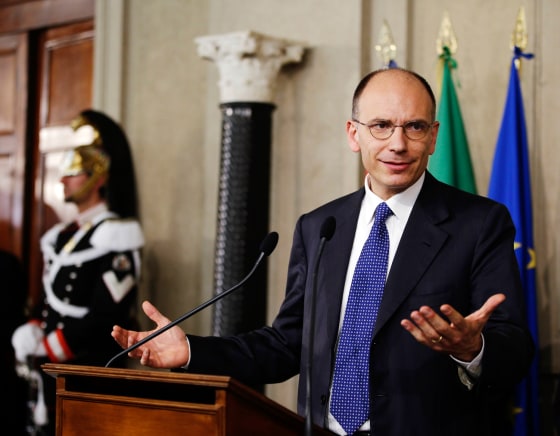ROME -- There is much about 46-year-old Enrico Letta, named as Italy's new prime minister designate on Wednesday, that is likely to please financial markets and Rome's international partners.
When Italian President Giorgio Napolitano asked Letta to form a new government, it signaled the end of a damaging two-month vacuum since elections in the euro zone's third largest economy in February. He was due to start talks to form a broad-based coalition on Thursday, with a parliamentary vote of confidence expected early next week.
Letta is young, moderate and pro-European, and despite his low public profile he has been a member of the European political elite for many years. Letta speaks fluent English and has a sound grasp of economics.
He is the second youngest Italian prime minister since World War II, yet with his wire-rimmed glasses and a hairline that has been receding for at least a decade, he exudes gravitas and responsibility.
In accepting the job from Napolitano two months after February's inconclusive election he made no attempt to hide the difficulties ahead for a country mired in deep recession and led by a discredited political class.
"I feel a strong responsibility on my shoulders, stronger than my shoulders' ability to support it," he told reporters at the president's palace.
He said Italy's politicians had "lost all credibility" and appealed to the whole of parliament to back his reform efforts, including convincing the European Union to change the direction of policy which is "too focused on austerity."
Letta comes from the centrist wing of the center-left Democratic party and has had a trail-blazing career since the early 1990s when he joined the defunct Christian Democrats (DC) who dominated post-war Italian politics.
At the age of 31 he was already deputy leader of the Popular Party, an offshoot of the DC, and when he became European Affairs minister in 1998 he was, at 33, the country's youngest post-war cabinet member.
He has always focused on EU affairs. In the 1990s he led a Treasury Ministry committee to prepare Italy's entry into the euro and served in the European Parliament from 2004 to 2006.
One of his tasks as prime minister will be to try to negotiate more budget flexibility for Italy from the EU, a position strongly supported by both the PD and Silvio Berlusconi's center-right, who will be backing his government.
Letta, the PD's deputy leader, was picked by Napolitano as a center-left figure who would be acceptable to Berlusconi in a broad, right-left coalition like the one that backed outgoing Prime Minister Mario Monti.
His uncle is Gianni Letta, Berlusconi's closest aide for over a decade. He succeeded Gianni as Cabinet undersecretary when Romano Prodi beat Berlusconi at the 2006 election and the two men changed places again when Berlusconi won two years later.
In an early sign of the challenges ahead, within minutes of Letta being summoned by Napolitano, Berlusconi was already laying down tough conditions to support his government.
Reuters' Barry Moody and James Mackenzie contributed to this report.
